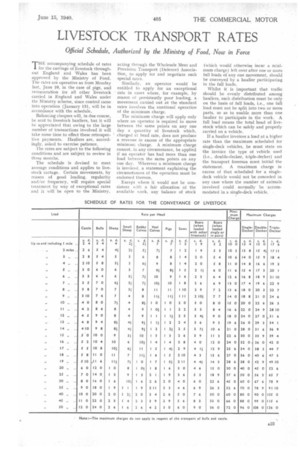LIVESTOCK TRANSPORT RATES
Page 25

If you've noticed an error in this article please click here to report it so we can fix it.
Official Schedule, Authorized by the Ministry of Food, Now in Force
THE accompanying schedule of rates for the carriage of livestock throughout England and Wales has been approved by the Ministry of Food. The rates are operative as from Monday last, June 10, in the case of pigs, and remuneration for all other livestock carried in England and Wales under the Ministry scheme, since control came into operation (January 15), will be in accordance with the schedule.
Balancing cheques will, in due.course, be sent to livestock hauliers, but it will he appreciated that owing to the large number of transactions involved it will take some time to effect these retrospective payments. Hauliers are, accordingly, asked to exercise patience.
The rates are subject to the following conditions and are subject to review in three months.
The schedule is devised to meet average conditions and applies to livestock cartage. Certain movements, by reason of good loading, regularity and/or frequency, will require special treatment by way of exceptional rates and it will be open to the Ministry, acting through the Wholesale Meat and Provision Transport (Defence) Association, to apply for and negotiate such special rates.
Similarly, an operator would be entitled to apply for an exceptional rate in cases where, for example, by reason of persistently poor loading, a movement carried out at the standard rates involves the continual operation of the minimum charge.
The minimum charge will apply only where an operator is required to move between the same points on any one day a quantity of livestock which, charged at head rate, does not produce a revenue in excess of the appropriate minimum charge. A minimum charge cannot, in any circumstance, be applied if an operator has had more than one load between the same points on any one day. Wherever a minimum charge is invoiced, a statement explaining the circumstances of the operation must be endorsed thereon.
Except where it would not be consistent with a fair allocation of the available work, any balance of stock (which would otherwise incur a minimum charge) left over after one or more full loads of any one movement, should be conveyed by a haulier participating in the full loads.
Whilst it is important that traffic should be evenly distributed among hauliers, such distribution must he only on the basis of full loads, i.e., one full load must not be split into two or more parts, so as to enable more than one haulier to participate in the work. A full load means the total head of livestock which can be safely and properly carried on a vehicle.
If a haulier invoices a load at a higher rate than the maximum scheduled for single-deck vehicles, he must state on the invOice the type of vehicle used (i.e., double-decker, triple-decker) and the transport foreman must initial the statement. A maximum charge in excess of that scheduled for a singledeck vehicle would not be conceded in any case where the number of animals involved could normally be accommodated in a single-deck vehicle.




















































